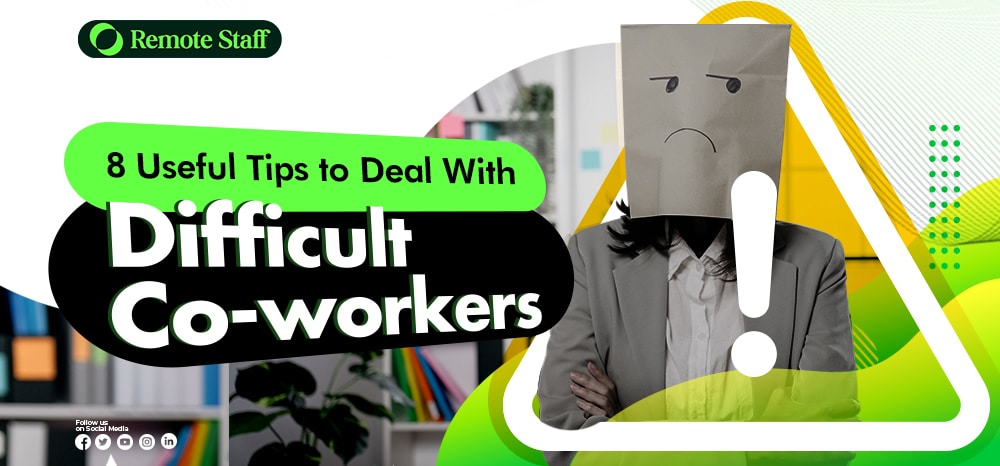You know them, and you might even have the misfortune of working with them. Nothing ruins your work experience, whether in a traditional or online job, than interacting and communicating with difficult co-workers. Although there are different types of difficult co-workers, they all share the same traits: they’re obnoxious, argumentative, and toxic to work with.
Knowing how to deal with difficult co-workers is a must if you want to stay at your job and retain your sanity. But how do you do that? Here are some tips that can help you get started.

Make Sure They’re the Problem, Not You.
Now don’t get me wrong; I’m not victim-blaming here. Before you jump to conclusions about your co-workers, ensure that there’s an issue to begin with. You don’t want to look like you’re overreacting and ruin your reputation to your co-workers now, do you?
Start with examining the reason/s why you find working with a specific co-worker so challenging. Maybe their mannerisms remind you of someone you don’t like. Or perhaps they were just having a bad day when you approached them for help that one time.
Try to consult your co-workers regarding their experience working with the co-worker you’re having difficulty with and see if they have the same experience. Once you’re done gathering information, check whether your issues are signs of a problematic co-worker before approaching them.

Avoid Bottling Your Emotions.
An unhelpful piece of advice your co-workers may say to you is to simply ignore your emotions and work like nothing’s happening. Not only will this not help you deal with difficult co-workers, but it tells them there’s nothing wrong with their actions. In addition, bottling your emotions might also negatively affect your productivity and the way you interact with your other co-workers.
Once you’ve made sure there’s an issue between you and your co-worker, talk to them about your concerns calmly and rationally. Explain why you find working with them difficult, and try to come to an understanding that suits both parties.

Never Retaliate to Unprofessional Behavior.
Experiencing unprofessional behavior from a co-worker doesn’t give you an excuse to retaliate in kind to them. If they start gossiping about you, the best way to deal with it isn’t to try to beat them at their own game. After all, fighting fire with fire often ends with the house burned down.
Aside from intensifying the problem, retaliating also shows that you’re no different from your co-worker giving you problems. It shows you’re unprofessional in the eyes of your co-workers, making them wary of interacting with you. If you want to resolve this issue, do so in a manner that you won’t regret later.

Don’t Just Do Nothing and Hope They Leave the Company Soon.
On the other end of the spectrum, nothing will happen if you don’t do anything and hope somebody else fixes your problem for you. Instead of fixing the problem immediately and potentially improving your relationship with your co-worker, you simply delay solving it.
What if your co-worker has no plans of leaving the company? Would you just suffer dealing with their attitude for as long as you’re in the company too? Sure, it may be risky and exhausting, but trying to solve your problem with your co-worker is better than doing nothing.

Talk to Them First Before Bringing Your Supervisors in.
If possible, try to deal with difficult co-workers privately unless some of your other co-workers are also involved. Doing this prevents gossip from spreading and dragging the entire workplace’s productivity and morale. You can do this by messaging them privately via your office’s communication app or through email.
When talking to them, clearly state why you called their attention and how it has negatively affected you at work. Be sure to remain neutral when talking to this co-worker and avoid sounding like you’re scolding them. Doing so just makes them defensive and makes coming to an understanding difficult.

Try to Understand Their Perspective.
One way you can remain objective when talking to difficult co-workers is by getting to know the reason/s for their actions. Doing this can help you better get along with them and understand how they see their work.
In addition, this can help you judge whether or not your reaction to their actions is merited or not. After all, it’s easy to misjudge ourselves and others when we’re acting in anger. Knowing their side of the story helps clear any misunderstandings between you and your co-worker.

Follow Up if Nothing Happens.
Let’s say you talked to the co-worker you’re having difficulty working with, and they promised to improve. Despite this, there’s still no sign of improvement on their part even after several days. If this is the case, having a follow-up conversation with them is needed.
Before following up on your previous conversation, consider first whether doing so will fix the problem or not. If you believe going in alone won’t help, or if your work and productivity are already affected, consider notifying your supervisor about this issue.
When asking your supervisor for help to deal with difficult co-workers, ensure you have a good case of why there is a problem. Gather proof of your co-worker’s behavior and how it has negatively affected your work and productivity.

Assess Whether or Not Dealing With Your Difficult Co-worker is Worth It or Not.
Sometimes, dealing with difficult co-workers isn’t worth the effort. If you don’t need to interact with them, for example, then perhaps you can simply avoid them. Doing this saves you time and energy in dealing with them so you can focus on your work instead.
However, there are also times when no matter how much you try to talk to them, they won’t change. Or worse, your management doesn’t take action on your difficult co-worker despite your protests.
In these instances, perhaps the best course of action is to simply cut your losses and leave. There’s no point staying in a company that doesn’t take action to employee concerns.

Dealing With Difficult Co-workers Made Easy.
Having to stand up for yourself in the face of difficult co-workers isn’t the easiest thing to do. You don’t know whether doing so will result in a mutual understanding or a dispute. But, by following the tips listed above, you will have an easier time dealing with difficult co-workers.

